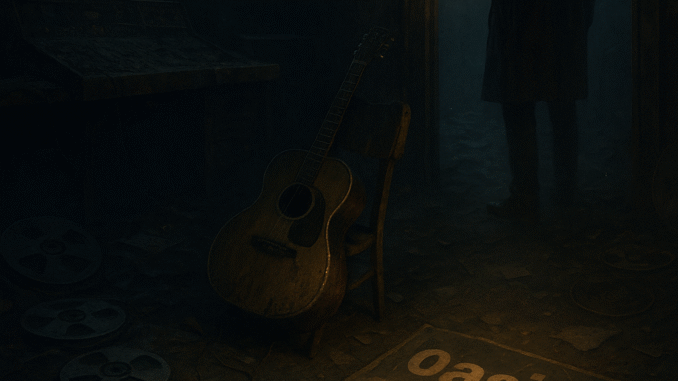
There are legends, there are myths, and then there are secrets so tightly guarded they blur the line between fantasy and fact. In the pantheon of British rock history, Oasis reign supreme as the working-class heroes who brought swagger back to music. But buried deep beneath the headlines, platinum records, and bitter sibling feuds lies a story Oasis fans were never meant to hear—a lost album recorded in the shadows, then erased from history by Liam Gallagher himself.
Rumors of a “lost Oasis album” have floated around forums and underground blogs for years, whispered like a forbidden spell. Titled “Yestermorrow”, the project allegedly began during a tumultuous week in 2004, in a rented studio outside Barcelona. This was no ordinary set of demos. According to former crew members, it was a fully fleshed-out masterpiece—a strange blend of Pink Floyd psychedelia, Beatles melancholy, and raw, snarling Oasis bravado. The twist? Liam hated it.
Noel Gallagher, ever the musical architect, reportedly pushed Oasis into uncharted sonic territory with “Yestermorrow”. It was a concept album about time, addiction, and regret—deeply introspective and drenched in metaphors. But Liam, who favored raw emotion and simplicity, believed the album was “pretentious, limp, and not Oasis.” He felt betrayed, sidelined, and, in his words, “sung over like a f***in’ guest vocalist on me own record.”
According to multiple anonymous sources—including a technician who worked night shifts during the sessions—Liam’s hatred for “Yestermorrow” went far beyond artistic disagreement. After a legendary fight between the brothers, Liam reportedly stormed out of the studio, returned the next day with legal threats, and demanded the entire project be scrapped. Within 48 hours, all known copies were wiped, backups destroyed, and Oasis moved on to record what would become “Don’t Believe the Truth”.But not all traces of “Yestermorrow” vanished. One engineer—who has since disappeared from the industry—allegedly kept a single hard drive containing four unreleased tracks. These tracks, whispered about on private fan servers, supposedly include “Glass Skies,” a haunting ballad sung entirely by Noel, and “Sister Morphine’s Mirror,” which some claim is the greatest unreleased Oasis song of all time.Why would Liam want such a monumental project buried forever? Insiders suggest it was personal. The lyrics, written almost entirely by Noel, reportedly touched raw nerves—referencing their late mother, the collapse of Liam’s marriage, and the cracks forming within the band. Some even say the song “Eulogy for a Brother” was a brutal autopsy of their relationship, recorded without Liam’s knowledge until playback day. That was the final straw.Fans have since launched campaigns to uncover “Yestermorrow”—with hashtags like #FreeTheOasisTapes and even Change.org petitions aimed at Noel Gallagher. Yet both Gallagher brothers have remained frustratingly silent. In one 2017 interview, Liam cryptically muttered, “Some things should stay dead. That album’s one of them.” Then, he smiled—and changed the subject.What makes “Yestermorrow” so fascinating is not just its mystery, but the fact that it may be Oasis’ most honest piece of work. Imagine an album where the swagger fades, and the vulnerability bleeds through. It could’ve redefined the band’s legacy, revealing layers most fans never got to see. And that might be exactly why Liam wants it buried—because it threatens the mythology he spent decades building.The industry, too, seems complicit in the silence. When asked about the sessions, former producers, roadies, and even Oasis bassist Andy Bell dodge questions or claim ignorance. Sony, which owns Oasis’ back catalog, reportedly destroyed the insurance paperwork for the Barcelona sessions—almost like someone wanted to erase the album’s very existence.Today, “Yestermorrow” exists in a strange purgatory: never confirmed, never denied, but believed in fiercely by a select group of hardcore fans. Bootlegs have emerged, though their authenticity is always in question. Some claim to have heard snippets on encrypted file-sharing networks; others call it all fantasy. But the passion is real—and it’s growing.If the master ever does surface, it could rewrite rock history. Until then, “Yestermorrow” remains Oasis’ greatest secret—an album too raw, too personal, and too dangerous to ever see daylight. And for Liam Gallagher, the one man who could bring it back? He’d rather the world forget it ever existed.

Leave a Reply